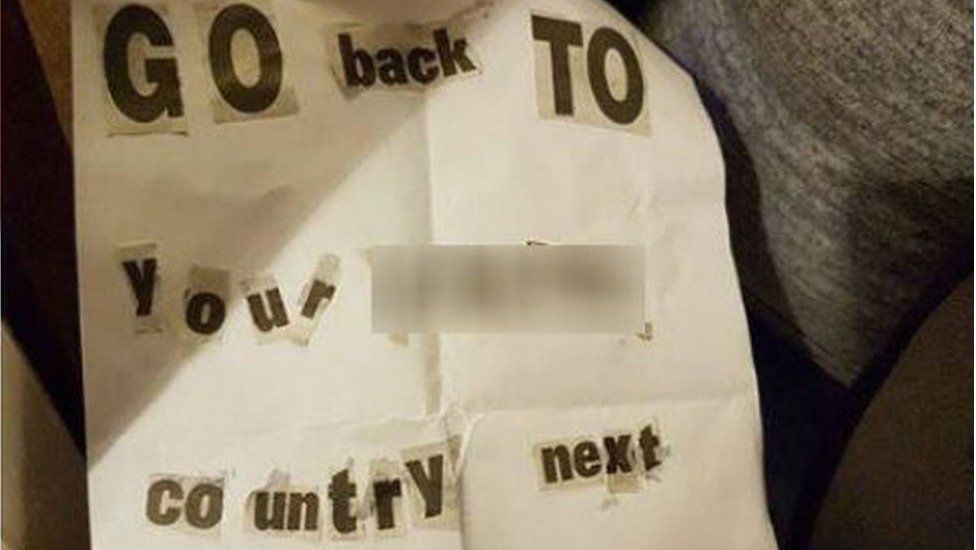UN blames UK politicians for Brexit hate crime spike
- Published

"Divisive" and "anti-immigrant" rhetoric by UK politicians during the EU referendum helped to fuel a spike in race hate crimes in the weeks before and after the vote, a UN body has said.
It said prominent political figures had "failed to condemn" racist abuse and created prejudices during the campaign.
Some 3,198 hate crimes were reported from 16-30 June - a 42% rise on 2015.
The UK government said it had a zero tolerance approach to hate crime, backed by strong and effective laws.
The EU referendum was held on 23 June - when the UK voted to leave the European Union.
Abuse peaked on 25 June - the day after the result was announced - when 289 hate crimes and incidents were reported across England, Wales and Northern Ireland.
A further 3,001 reports of hate crimes were made to police between 1 and 14 July - equivalent to more than 200 every day.
'Atmosphere of suspicion'
The report - by the Committee on the Elimination of Racial Discrimination - said it was "seriously concerned" at the sharp increase, and expressed concerns at the negative portrayal of immigrants in the UK and a rise of racist online abuse.
It said the EU referendum campaign had been marked by "divisive, anti-immigrant and xenophobic rhetoric".
The report added: "The committee remains concerned that despite the recent increase in the reporting of hate crimes, the problem of underreporting persists, and the gap between reported cases and successful prosecution remains significant.
"As a result, a large number of racist hate crimes seem to go unpunished."
Members also said they remained concerned at the "negative portrayal" of ethnic minority communities, immigrants, asylum-seekers and refugees in the UK, including coverage by the media.
It said the UK government's anti-terrorism Prevent strategy had created "an atmosphere of suspicion towards members of Muslim communities".
It urged the government to review the counter-terrorism measure to ensure it does not "constitute profiling and discrimination on the grounds of race, colour, descent or national or ethnic origin".
The report also criticised plans to replace the Human Rights Act of 1998 with a new British Bill of Rights, warning that it could lead to "decreased levels of human rights protection".
'Acrimonious and divisive'
Imogen Foulkes, BBC Geneva correspondent, said the report had made some "pretty blunt criticisms".
She said it had called for politicians to be "much more open about condemning abuse" and for strict sentences against those guilty of expressing hatred.
"There are laws in Britain against hate crime that the UN feels are not being used and that therefore there is a climate of impunity," our correspondent added.
David Isaac, chairman of the Equality and Human Rights Commission, said the organisation shared the UN's concerns and supported its call for "effective investigation and prosecution of all acts of racist hate crime".
"There are concerns that the acrimonious and divisive manner in which the referendum debate was conducted exacerbated worrying divisions in British society, and has been used by a minority to legitimise race hate", he said.
"Political parties need to come together and show leadership, working with the relevant crime prevention agencies," he added.
A UK government spokeswoman said the UK had "one of the strongest legislative frameworks in the world to protect communities from hostility, violence and bigotry".
"We keep it under review to ensure it remains effective and appropriate - and recently published a comprehensive new Hate Crime Action Plan to drive forward the fight," she said.
- Published22 July 2016
- Published8 July 2016
- Published27 June 2016
- Published27 June 2016